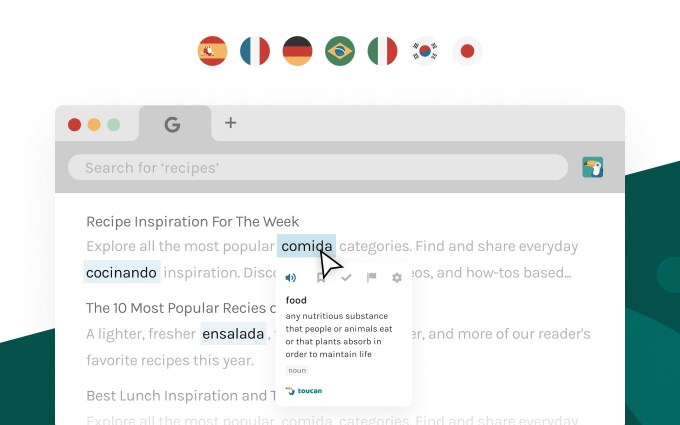Toucan, a startup that helps users learn a new language while they browse the web, is announcing that it has raised an additional $4.5 million in seed funding.
As I wrote last fall, the Santa Monica, Calif.-based startup has built a Chrome extension that scans the text of whatever website you’re reading and translates select words into whichever language you’re trying to learn. That means you’re expanding your vocabulary without having to make time to study or otherwise change your behavior.
Toucan currently supports seven languages — Spanish, Korean, French, German, Italian, Portuguese and Japanese. Co-founder and CEO Taylor Nieman said the company now has around 60,000 monthly active users, all acquired organically.
“On the surface, Toucan can look like a toy, but there’s massive engineering tech on the backend,” Nieman added.
For one thing, although the startup has a team of human translators, it also relies on machine learning and natural language processing to understand the context of each word and make sure it’s being translated properly. Nieman also said that the company also takes an intelligent, personalized approach to the translations that appear over time, allowing them to become more complex in order to keep challenging users.

Image Credits: Toucan
Toucan is free, but users can subscribe to Toucan Premium, which starts at $4.99 per month and offers a higher density of translated words. Premium subscribers can also opt in or out of advertising — apparently the ability to “own” a word (a.k.a. have your sponsorship message appear anytime that word is translated) is popular enough that some paying users don’t want to lose it.
Toucan has now raised a total of $7.5 million. The new round was led by LightShed Ventures, with participation from new investors Next Play Ventures, Concrete Rose Capital, GingerBread Capital, Form Capital, Goodwater Capital, Hampton VC, Spacecadet Ventures, GTMfund, Baron Davis Enterprises and Human Ventures, as well as existing investors GSV Ventures, Amplifyher Ventures and Vitalize.
“Screen time is escalating globally with younger generations living their lives always connected,” said LightShed Ventures General Partner Richard Greenfield in a statement. “Toucan seamlessly integrates language learning into the websites (and soon apps) you are already using via a simple browser extension transforming screen time into learning time.”
Nieman said Toucan will use the new funding to expand the team from 12 to 16. It’s also planning to internationalize — so not just translating English to Spanish, but Spanish to English, and so on — and is launching a new Safari extension (it will support more browsers in the future). The ultimately vision is for Toucan to be “layered wherever you are.”
“We want to be this augmented layer of learning on the web, on mobile browsing, the most popular social apps and even in the physical world,” she said, predicting that in the future, you might be “wearing a crazy cool contact lens that can translate a sign on the subway and provide you with those same micro-moments of learning.”
from Startups – TechCrunch https://ift.tt/3nq6DvS
Comments
Post a Comment